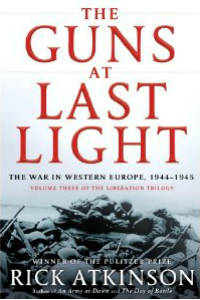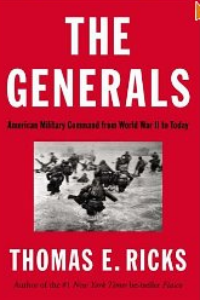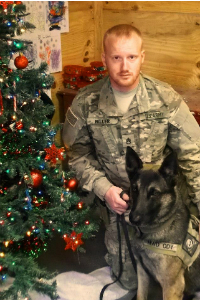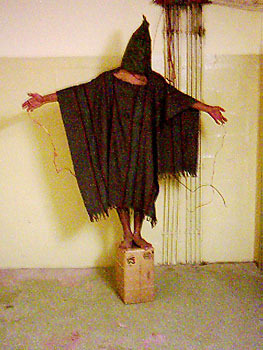Thomas E. Ricks's Blog, page 138
December 24, 2012
Gen. Trainor, you need to listen harder to what that departing lieutenant is saying

By Lt. Cdr. Victor Glover, USN
Best Defense office of JO
retention
This is a great debate of great importance. The topic of leadership writ large and
the risk management strategies of our leadership culture are national security
issues that don't receive much media attention until tragedy befalls us. Instead we ought to be searching for
root causes and details whenever we can. The
letter from the Anonymous Lieutenant who is resigning his
commission and the responses to it, specifically the retired Marine General's, highlight the very disparity that the young
officer elucidated (very eloquently I might add).
The responses to this young warrior have been one-sided in attempts to
paint a picture that, although precise in argument, is offset from the actual
target. I agree that there
is a way to criticize the military enterprise as Captain Brett Friedman points
out and that, as Capt. Doug Pelletier states, "junior leaders need to be actively
involved in the debate about the future of our organizations." This articulate
LT is doing just that and meeting standard intuitional (and dated)
responses. Unfortunately the responses have overlooked a trend of risk
aversion that is affecting our leadership department-wide.
In the Navy the numbers of Commanding Offices relieved in recent years
has garnered attention in the media and academia. As US Army War College faculty member
Navy Captain M. F. Light notes in his analysis of recent Navy CO firings, we have a "small but steady tradition-fed
stream of misconduct at all levels-misconduct that is more likely than it once
was to be detected, more harmful to the Navy's mission, and more likely to make
headlines when it involves a CO." This
very public trend of firings is changing the risk management capacity of our
services. Technology
constantly changes, the enemy has changed, our acceptance of risk has therefore
changed and often it is this aspect of change that impacts our junior officers
and their perceptions of the organizations they have volunteered to
serve. It is important to
understand this perception and the impact it has on retention. More needs to be written on risk
management and its impacts on job satisfaction and retention.
The military culls talent intentionally and unintentionally. In a 2011 Proceedings article the Honorable John Lehman adamantly defended aviation culture and
lambasted the "intolerable policy of ‘zero-tolerance' applied by the Navy and
the Marine Corps." Zero-tolerance
creates and environment where organizational change and social vigor are often
stymied. While we need to
do a better job of identifying and encouraging our creative and novel young
leaders, this must be balanced with the protection of the institution. The Captain Honor firing was an example of the US Navy attempting to protect the institution, though some
consider it an example of risk-aversion gone wrong.
Institutional inertia is necessary. From my own experience as a first tour
combat aviator who wanted to exact punishment on an enemy that attacked a
convoy I was escorting. I
wasn't able to due to the timeline required to get approval. I now understand that this is often a
necessary aspect of combat and any coordinated venture in attempts to
dispassionately do the right thing. And
as long as the right thing is the goal, I am OK with institutional
inertia. At issue are the
times where the good of the organization is sacrificed for the good of a career
or ego.
The impact of leadership is not only immediate in addressing the issues
of the day, but it is long lasting in that leaders create or destroy
culture. This culture
leaves a wake that is apparent long after the leaders themselves have moved
on. The types of people we
retain and promote are affected by this. We have looked at bonuses and other
incentives as retention tools but no military service has actively addressed
leadership culture as a retention matter, why not? In 1998 Rear Admiral Natter and
Lieutenants Lopez and Hodges wrote a prophetic article titled "Listen to the JO's." They
cited reasons why JO's were dissatisfied with and leaving the Surface Warfare
community. In this
masterfully written and widely applicable analysis they report that junior
officers, "spoke of feeling betrayed: the ideals for which they had
joined-Honor, Courage, Commitment-had not materialized. The problems that they
described are real, serious, and require that we address them if we want to
have a say in who will man and lead our Navy of tomorrow."This was before the
attacks of September 11, 2001. As
we wind down the wars that have ensued, the chorus of the junior officer is a
vital source of experience and reason that needs to be seriously
considered. Senior leaders
like to call today's military the most combat experienced ever. What war has honed, let us respect.
I encourage you to reread the Anonymous LT's words and think about how
he got to that point vice trying to make a point. As Tim Kane warned in his Harvard Business Review blog entry "Bleeding Talent," "we commit a sin of omission if we neglect to offer criticisms" of military leadership.
As someone who desires to lead our military men and women into the
uncertain waters of the future, I am listening to this Marine LT's plea that "what concerns me ... is that among my peers, the ones with ideas
are the ones getting out, because they just don't feel the organization values
them." We need to be enterprising
in addressing this issue as we have been in the face of issues past. Please ask
yourself: What are you willing to do to
create and sustain value in our young leaders?
Lieutenant
Commander Victor Glover recently completed a tour as a squadron department head
on the USS George Washington (CVN-73). He is currently a Legislative Fellow in
the United States Senate.
Beer call on the concerns of the departing Marine lieutenant, and the responses

In light of the recent
discussion on "The Best Defense," former Marine
lieutenants Michael Haft and Harrison Suarez invite you to join in a
constructive discussion about the state of ideas in the Marine Corps and how to
internalize lessons learned from the past decade of war.
To set the table for the discussion, here is
their suggested reading list:
"Why Our Best Officers are Leaving" - The Atlantic
"Military Needs More Disruptive Thinkers" - Small Wars Journal
"General Failure" - The Atlantic
"General Trainor: I Spent a Career Thinking and
Being Heard"
Please post any additional suggestions to the
comments section.
The simple premise for their
discussion is that the Marine Corps is a great institution, one that America
needs, but, like any organization, there is always room for improvement.
All services and all ranks are welcome.
Different perspectives encouraged.
We'll meet up at 6:00pm on December 28th, 2012 near Dupont Circle.
Bier Baron Hotel
1523 22nd Street
Northwest
Washington, DC 20037
Please RSVP to Harrison at suarezhc@gmail.com
Don’t tell the Japanese!

There are a bunch of carriers and
amphibs (small carriers, truth be told) gathered in Norfolk. I've never seen so
many in one place before. The Navy says, "The aircraft carriers
USS Dwight D. Eisenhower (CVN 69), USS George H.W. Bush (CVN 77), USS Enterprise
(CVN 65), USS Harry S. Truman (CVN 75), and USS Abraham Lincoln (CVN 72) are in
port at Naval Station Norfolk, Va."
December 21, 2012
The last of Atkinson’s marvelous World War II series: ‘The Guns at Last Light’

As a holiday gift for
myself, I read an advance copy of the last of Rick Atkinson's trilogy on World War II in Europe. The book is out in May, but you
can pre-order on Amazon right now.
It was like slipping
into a warm bath: Good writing ("Sherman pyres on the Caen plain") and fine
narrative.
But most of all,
fascinating facts:
Prostitutes in
blacked-out wartime London would feel for the rank insignia of prospects before
naming their price. (And a quickie done standing up inside a overcoat was
called "Marble Arch style.")
Nearly half the
American troops arriving in Europe in 1944 were still teenagers. By contrast,
by the end of that year, 2 million of Hitler's 3.6 million soldiers were older
than thirty.
Germans accustomed
to the Eastern Front were stunned when moved to the West to battle Americans
who enjoyed overwhelming air superiority -- it was, Rommel warned, like "being
nailed to the ground."
Speaking of the
Soviets, Stalin comes off a bit like Edward G. Robinson, speaking a few phrases
of English, such as "You said it!" and "What the hell goes on around here?"
About 10 percent of
all American combat casualties during the war came during the Battle of the
Bulge.
The Red Army lost
more soldiers at Stalingrad that the entire U.S. military did in the entire
war.
The heaviest
bombing month of the war was March 1945, with 130,000 tons dropped on
Germany.
After the war, 21
ships laden with dead American soldiers brought them home. The first carried
5,060 bodies. What a Homeric image.
‘The Generals’ gets two thumbs down

My book The Generals got its first entirely negative review, from Col. Gian
Gentile. Why am I not surprised?
Colonel Gentile, a strategic bombing expert
who also was a cavalry squadron commander in Iraq in 2006, concludes that I am
both simplistic and dangerous: "In one sense Mr. Ricks is right that the American army has
not produced strategic thinkers in its higher ranks. But his simplistic
solution is also quite dangerous if the policymakers and others who read it
come to believe it is true. America at war with Syria, Iran, Yemen, sure -- just
relieve a few generals, get the right ones in place, and victory will be
assured."
Then, in a really low blow for a historian, he accuses me of
having the mindset of a political scientist: "He undertakes a political science approach to
the exploration and analysis of history, developing a template and then
compelling the past to conform to that template."
He also says the book is a regression from the works of John
Keegan. Well, if I have to regress from anyone, I'll take Keegan. I am not as
good a baseball player as Derek Jeter, either.
What I don't get is that he accuses me of failing to show
that relief of generals leads to better results. I don't know how he can say
that, given that I discuss how Africa went better after Fredendall was ousted,
Anzio went better after Lucas was booted and Truscott took over, Korea went
better after Ridgway went over there and started cleaning house.
Does he think Vietnam would have gone any
worse had any generals been relieved for being ineffective? But then Gentile is
a big fan of Westmoreland -- "Westmoreland, I think, was very
efficient, very proper, highly intelligent, a good organizer, a good manager,
and I think up to a -- and I think a good leader" -- and I am not.
Also,
I'd like to file an objection to the way he uses "narrative" like it was some
kind of dirty word. Rather, I think it is what makes us human -- putting
together events to try to make sense of the rushing world of reality. We know
other animals use tools, but as far as I know, we are the only animal that uses
narrative.
Rebecca’s War Dog of the Week: Happy holidays from Afghanistan

By Rebecca Frankel
Best Defense Chief Canine Correspondent
This time last year, Sgt. Alyssa Jackson,
Capt. Katie Barry, and Sgt. William Vidal, who made up the entire veterinary
team at Bagram AFB, were celebrating the holiday season in Afghanistan. (They
are the exceptional team-of-three who organized the war-dog
run in Bagram earlier this year.) And while the three
have since left their post in Afghanistan and are now serving on other Air
Force bases around the world, they have fond memories of their last Christmas
spent with the MWDs and their handlers stationed at Bagram.
Jackson said the dogs especially were remembered during the
holiday season. "Many people would send us care packages
for the dogs. The packages would have kongs, treats, and all kinds of toys," he
said. "It was great that our Military Working Dogs are not forgotten during the
holidays."

Above, MWD Paty sports reindeer antlers
in the small veterinary office on base. Barry writes that when this photo was
taken Paty was suffering from "pretty severe PTSD so she was on her way home.
She's been dispo'd and I think her handler adopted her."
This photo at left comes straight from Zombalay,
Afghanistan, taken just a few days ago. Handler SSG Donald Miller posed for
this postcard with his Patrol Explosive Detector Dog, Ody. The pair has been in
country since September.
[[BREAK]]
The dog pictured below with his handler is Carlos, another Air
Force dog stationed at Bagram last December. Sadly, the vet team told me that he
died not long after returning to the States. While a sweet dog, Carlos could be
a little prickly while getting a check up, which is why he's wearing a muzzle --
a common precautionary measure vets handling MWDs take during even the most routine
exams.

Also from the Bagram vet office we have MWD Ajax. Jackson
had just opened a box her aunt had sent when the dog and his handler came in
for an appointment. "Ajax was pretty nervous around us," Jackson writes. But
he "sure did put on a huge puppy smile when we put his Santa hat on."

Speaking of Santa...
If you are interested in sending a care package over to dog teams or helping
provide any needed items
to dog teams deployed in Afghanistan (or elsewhere) this holiday season, check
out the U.S. War Dog Association run by
the incomparable Ron Aiello, a former Vietnam dog handler, who's been sending
care packages out to dog teams around the world for the last ten years.
December 20, 2012
Sky reviews the U.S. handling of Iraq, spanks both the Bush and Obama admins

Emma Sky, who has written for this blog on occasion, recently issued a sharp paper at CNAS that blasts the handling
of Iraq by both the Bush and Obama administrations. She reports that Iraqis
believe that the United States has lost Iraq to Iran, and that Iraqis now
travel to Tehran to ask permission to oust Maliki. She concludes that, "America
could learn that money can't buy love, that relationships are key, that
strategic patience is needed, that allies should not be ignored and that a
regional approach is needed as well as a bilateral one."
CNAS, a full-service outfit, also
offered this blueprint on how to fix things.
Mama tried

The authorities said the other day that Brig. Gen. Jeffrey Sinclair, the Army's celebrity one star,
will face a general court martial and could wind up doing life in prison.
My guess: A plea deal
that winds up with him doing a year or two. Then again, I've been surprised
before.
(HT to Attackerman)
Accountability at State over Benghazi contrasts with the lack of such at the Pentagon over the Abu Ghraib mess

A bunch of senior State Department officials got booted over security
failures at Benghazi. A friend comments, "This
is functionally equivalent to the sacking of GOs."
The contrast to the lack of accountability for the Abu Ghraib mess is
striking. And I am confident that the prisoner abuse scandal,
by outraging Iraqis and fanning the flames of the insurgency, resulted in the
deaths of more Americans than did the lapses in Libya.
December 19, 2012
A Marine general takes on our LT: I spent a career thinking and being heard

By Lt. Gen. Bernard
Trainor (USMC, ret.)
Best Defense voice of
experience
Of course any hierarchical and conservative institution
can be resistant
to change and unwelcoming of out-of-lane independent
thought. But I believe the Marine Corps has a pretty good record
of being an exception, i.e. many officers in the chain encourage that sort of
thinking and help get a subordinate's message a hearing at a higher level.
I was the recipient of such support from the time I was a
new lieutenant and over the years came to expect it. And I don't think I was an
exception. Let me cite some milestones in my career:
1952 -- Korea -- 2d Lt. Rifle Platoon Leader -- We were
taking unwarranted patrol casualties following prescribed techniques. I
proposed some changes to the Bn. CO during a visit to my platoon. He rejected
them out of hand, but the S-3, Maj. J.K. Hogan, accompanying him, saw merit in
my ideas and successfully went to bat for me and overcame the CO's resistance.
1953 -- 8th Marines -- 1st Lt. At an Officers Call I
argued that the USMC triangular organization was less effective than a square
formation in the embryonic days of helicopters. The Regt. CO Col. DeWolf
Schatzel (one of the notorious "Chowder Society" members in the Unification
fight) encouraged me to put my arguments in writing and submit it to the Marine Corps Gazette. It was
published as "The Triangle and the Square." It was a voice crying in the
wilderness, but I was encouraged, not discouraged by my seniors.
1960 -- 1st Recon Bn Capt. Company Commander -- Upon
returning from exchange duty with the Royal Marines, I argued for the adoption
of some of the deep penetration recon techniques the Brits were using
against the EOKA
insurgency in Cyprus as being ideal for Vietnam, which was looming on the
horizon. My proposals were opposed by some within the Recon community, but
supported by Lt. Col. Hank Woessner, Bn CO and subsequently by the CG, Maj.
Gen. Jim Masters. The techniques were expanded, improved, and served as the
precursor for the successful Sting Ray
operations in Vietnam.
1968 -- MC Command & Staff College -- Maj. Instructor
-- I recommended and sold a series of out-of- the-box "creative thinking"
initiatives as part of a curriculum change to the senior instructor, who
supported it and passed it to Maj. Mike Ryan, the director, who then carried the
ball and won over the director of the ED Center and the hated school solution
"Yellow" was minimized (I hope it has remained so).
1970 -- Vietnam -- Lt. Col. CO 1/5, Quick Reaction Force
-- Over the vehement opposition of the ADC, the CG, Maj. Gen. Chuck Widdecke (a
tough SOB if there ever was one) overruled him and supported a new attack
SOP/technique that I proposed to introduce.
Needless to say, the more senior I became, the easier it
became to have my voice heard. But the point is that throughout my career
senior Marine Corps leaders welcomed and were open to new ideas -- and along
the way, most of the officers between me and the decision-makers were a help,
not a hindrance.
To repeat, I think my experience is more representative than those
who have been frustrated by what they categorize as a closed-minded Marine
Corps bureaucracy.
Lt.
Gen. Bernard "Mick" Trainor (USMC, ret.) is a veteran of combat in Korea and
Vietnam, a former military correspondent for the New York Times, and co-author
of several books on the military, most recently Endgame.
Thomas E. Ricks's Blog
- Thomas E. Ricks's profile
- 436 followers



